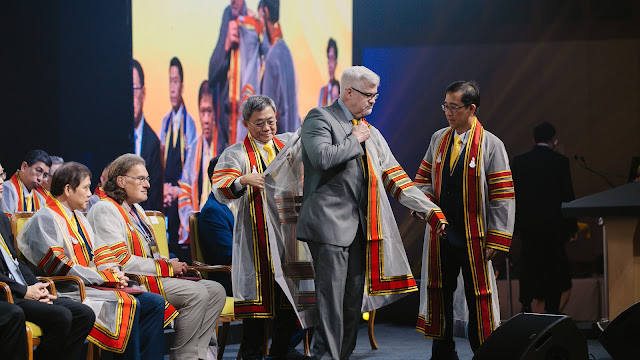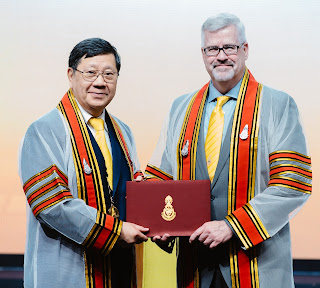USU Professor Dr. Mark Bowyer Honored by the Royal College of Surgeons of Thailand
Uniformed Services University professor Dr. Mark Bowyer was inducted as an Honorary Fellow of the Royal College of Surgeons of Thailand on July 27, 2023
August 24, 2023 by Hadiyah Brendel
Dr. Mark Bowyer, the Ben Eisman Professor of Surgery in the Department of Surgery at the Uniformed Services University (USU), was inducted as an Honorary Fellow of the Royal College of Surgeons of Thailand on July 27, 2023.
Bowyer originally received the invitation for his induction in 2020. However, the pandemic delayed his conferment until this year. He was one of only five honorary fellowship recipients presented the honor since 2020, and it was bestowed during the 48th Annual Scientific Congress of the RCST in Pattaya, Thailand.
Of his conferment, Bowyer said educational videos he produced at USU in 2008 and 2012 on Advanced Trauma Life Support (ATLS) made him an unintentional “face” of ATLS and have indirectly helped train thousands of medical providers in Thailand.
Bowyer is an international force in trauma education. As one of the principal architects of the ASSET (Advanced Surgical Skills for Exposure in Trauma) course he has shepherded its promulgation to more than 100 sites in 11 countries. Bowyer was able to bring the ASSET course for surgeons, which was largely developed at USU, to Thailand in 2013. This resulted in the training of hundreds of surgeons in Thailand over the last decade.
“I am humbled to be recognized with this honorary fellowship in the RCST for my small role in helping to improve trauma care in Thailand. Being an honorary fellow of the RCST will allow me to continue to work with my Thai colleagues to continue our shared goal to improve the care of traumatically injured patients,” Bowyer added.
Additionally, Bowyer serves as the Surgical Director of Simulation at USU’s Val G. Hemming Simulation Center. Bowyer has been on the forefront of adopting the use of surgical simulators as a replacement for animals in the teaching of advanced trauma and acute care surgical skills. He has an ongoing interest and involvement in developing and validating augmented and virtual reality, as well as robust trauma, laparoscopic, acute care surgical, triage, and critical care-based simulators.
As an acknowledged expert in the fields of trauma and medical simulation, he is highly regarded as a speaker, having presented in many national and international forums. Bowyer has published widely on a diverse range of critical care, trauma, and simulation topics.
Bowyer earned his Doctor of Medicine degree from the University of Colorado Health Science Center in Denver. He completed his general surgery residency at the David Grant U.S. Air Force Medical Center at Travis Air Force Base, California. Bowyer then completed his critical care medicine fellowship at the University of California in San Francisco.
He retired as a colonel in the Air Force after 22 years of active duty military service as a trauma and combat surgeon. He formerly served as president of the Ambroise Paré International Military Forum, president of the Society of Air Force Clinical Surgeons, and chairman of the American College of Surgeons (ACS) Committee on Trauma Surgical Skills committee.
Bowyer is the recipient of numerous awards, including the 2017 Robert Danis Prize awarded by the International Surgical Society for the most important and personal contribution to the fields of trauma.
“Dr. Bowyer is an internationally recognized leader in trauma care whose work in simulation has had a profound impact in the field. He has developed the ASSET course in conjunction with the ACS and the ASSET+ course for use by us in the military. These courses have saved countless lives and been exported all over the globe,” said the dean of USU’s School of Medicine, Dr. Eric Elster. “This recognition by the RCS Thailand is a testament to that global impact.”







